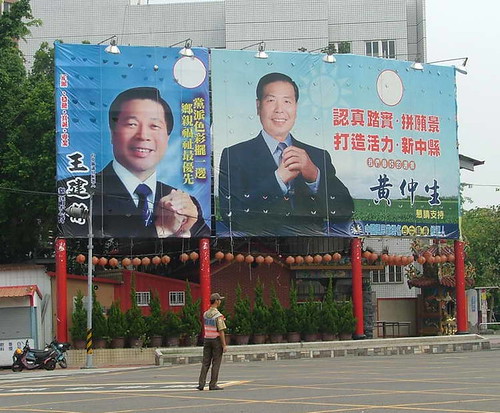When voting on the budget yesterday, the legislature passed a resolution and funding which would force the referendums being held with the legislative and presidential elections to be held in a "two step" voting process (you first pick up your legislative ballots, fill it out, drop it in the box, then go get your referendum ballots). The DPP caucus is calling the move illegal and unconstitutional, and therefore invalid.
Another resolution requires the Central Election Commission (CEC) to hold the
legislative and presidential polls and four referendums either by using a
two-step voting procedure, or by issuing the referendum ballots separately from
the election ballots.
That resolution will cause controversy because the CEC has decided to follow a one-step procedure for the Jan. 12 legislative elections and the referendums -- one initiated by the DPP on recovering the KMT's stolen assets and an anti-corruption referendum initiated by the KMT. Under this system, voters will receive their legislative and referendum ballots together when they enter a polling station.
The Cabinet has said any ballot cast through a two-step procedure would be considered invalid...
The resolution passed yesterday states that the CEC cannot refuse to provide a budget for local election commissions that use a two-step system...
Teng declined to comment when asked if the CEC would approve additional funding for two-step voting if local election commissions asked for more money.
"The commission has decided to employ the one-step voting scheme, and that's our set policy," Teng said.
This problem seems unlikely to go away, and since even though the CEC seems to have the right to decide how to hold the system but has no way to enforce it, I think the pan-blue camp has the upper hand. This resolution only helps their cause. The DPP can only
insist it will replace any poll-workers who won't cooperate with a one-step system. I'm not sure they have guts to do it, or what the negative consequences would be.
=================
I think the difference in the two systems can be easily analyzed: if you do everything in one step, you'll have higher referendum participation and also a slightly lower number of invalid votes cast (after all, with four ballots, even color-coded, there will be a higher chance you'll put the ballot in the wrong box). With a two-step system, you'll have lower referendum participation and a smaller number of invalid votes. There's no "secret ballot issue," since with either system someone can tell if you are taking the ballot or not.
The DPP wants to hold this in one step to raise voter participation in the referendum.
The KMT is opposing it reduce that participation. But they can't say that! So the only excuse they have left is that the one-step system would be a
mess, and raise the number of invalid votes. So their argument focuses on saying the DPP
intentionally wants to make the election a mess. And the only way they can explain is that the DPP wants to postpone the election, or declare martial law, or find some other way not to give up power.
And this is why they continue to cling to these absurd fantasies about A-bian wanting to become emperor, because it's their only argument to discredit a one-step voting system and their insistence on using a two-step voting system in defiance of the CEC.



